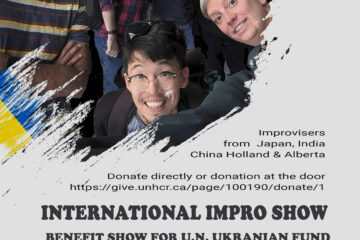THOUGHTS, IDEAS, QUESTIONS, PROCESS, LESSONS,
Student Post
STORIES END. STORIES BEGIN.
OSHOW – Week 7
Week 7
A.I. translated. Original Japanese writing below.
 The class is gradually coming to an end. I still miss Japan, but at the same time, I’ve been feeling more and more sadness about parting from the friends I’ve spent time with here.
The class is gradually coming to an end. I still miss Japan, but at the same time, I’ve been feeling more and more sadness about parting from the friends I’ve spent time with here.
Lately, I’ve been doing a lot of scene work, focusing on Keith’s storytelling techniques: Platform, Tilt, and Reincorporation. Day by day, I feel them becoming more ingrained in my body. I can naturally create a diverse Platform, use Tilt to have a strong impact on the relationship with my scene partner, and connect what I’ve scattered around the Platform. I sense that I’m developing these skills.
I recently had an online conversation with Wataru, an improviser in Japan whom I greatly respect. He, too, was captivated by Keith’s improv, and our conversation naturally turned to his philosophy. He said, ‘Keith’s improv seems more like art than entertainment. It’s less accessible compared to traditional comedy improv and harder to delve into, but it touches on the essence of humanity. Because it’s something you can spend your whole life exploring, it’s so rewarding.’
In fact, Keith himself has always said, ‘I still don’t know how to teach improv,’ and he also said, ‘If I figure it out, I probably won’t teach it anymore.’ He sometimes denies things he’s said in the past and intentionally structured his book, ‘Impro for Storytellers,’ so that it doesn’t provide definitive answers but allows readers to explore it in their own way. I think he enjoyed the process of exploration rather than providing answers.
Keith left a legacy with formats like TheatreSports, Maestro, and Gorilla Theatre. Currently, iTi (International TheatreSports Institute) is creating guides for these formats in various languages, and I’m working on the Japanese version. I believe that once these translations are mostly completed, we can do away with the performance licensing system. What’s more important is conveying his philosophical thoughts accurately through these guides and then continuing to explore. If he were alive, he might even pick up the guidebook, say ‘Throw away the book, and embark on a journey.’
After studying Keith’s improv under Shawn for nearly two months, I find myself more eager than ever to delve into improv. His improv opens up possibilities for people and stories like nothing else, and I feel incredibly blessed to have developed this passion. When I return to Japan, I’ll likely base my teaching and performances on his improv. However, what I want to do through this isn’t to stick rigidly to his philosophy but to prepare myself with a strong spirit and skills for the journey.
In 2017, I was moved when I saw Impro Theatre’s Full Length Impro at an improv festival in Dubai and introduced their style to Japan. I explored with various people for nearly two years, but I felt like I was missing something fundamental. Impro Theatre and their sister company BATS Improv all had a solid foundation in Keith’s improv. That’s why they can create fantastic full-length works on top of it. On the other hand, we didn’t have that foundation. We could reach a destination without it, but I couldn’t find the state of mind I was satisfied with. I left the team and decided to start exploring improv from scratch. And now, I’ve come full circle to Reincorporation at the origin of my improv journey, Keith’s improv.
I don’t think this journey has been a waste because without the Tilt of leaving the team, I couldn’t have written this story. I’ll be returning to Japan in two weeks, but from there, a new story will begin. I’m very excited about what lies ahead.”




0 Comments